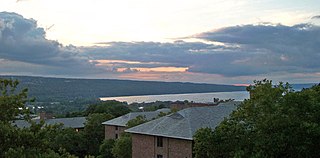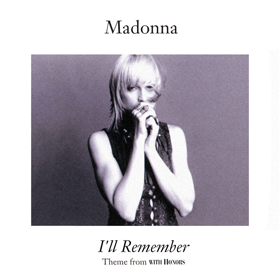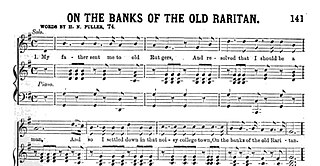
"Anchors Aweigh" is the fight song of the United States Naval Academy and unofficial march song of the United States Navy. It was composed in 1906 by Charles A. Zimmermann with lyrics by Alfred Hart Miles. When he composed "Anchors Aweigh", Zimmermann was a lieutenant and had been bandmaster of the United States Naval Academy Band since 1887. Miles was midshipman first class at the academy, in the class of 1907, and had asked Zimmermann to assist him in composing a song for that class, to be used as a football march. Another academy midshipman, Royal Lovell, later wrote what would be adopted into the song as its third verse. Another member of the Naval Academy Band, Willy Perlitz Jr., assisting in writing the music for the different instruments used in "Anchors Aweigh".

"The Anacreontic Song", also known by its incipit "To Anacreon in Heaven", was the official song of the Anacreontic Society, an 18th-century gentlemen's club of amateur musicians in London. Composed by John Stafford Smith, the tune was later used by several writers as a setting for their patriotic lyrics. These included two songs by Francis Scott Key, most famously his poem "Defence of Fort McHenry". The combination of Key's poem and Smith's composition became known as "The Star-Spangled Banner", which was adopted as the national anthem of the United States of America in 1931.

Quill and Dagger is a senior honor society at Cornell University. In 1929, The New York Times stated that election into Quill and Dagger and similar societies constituted "the highest non-scholastic honor within reach of undergraduates."
"Carry Me Back to Old Virginny" is a song written circa 1878 by James A. Bland (1854–1911), an African-American composer and minstrel performer. It was Virginia's state song from 1940 until 1997.

"Marching Through Georgia" is a marching song written by Henry Clay Work at the end of the American Civil War in 1865. The title and lyrics of the song refer to U.S. Army major general William T. Sherman's "March to the Sea" to capture the Confederate city of Savannah, Georgia in late 1864.

The Cornell University Glee Club (CUGC) is the oldest student organization at Cornell University, having been organized shortly after the first students arrived on campus in 1868. The CUGC is a thirty-nine member chorus for tenor and bass voices, with repertoire including classical, folk, 20th-century music, and traditional Cornell songs. The Glee Club also performs major works with the Cornell University Chorus such as Beethoven's Missa Solemnis, Handel's Messiah, and Bach's Mass in B Minor.

"Far Above Cayuga's Waters" is Cornell University's alma mater. The lyrics were written circa 1870 by roommates Archibald Croswell Weeks, and Wilmot Moses Smith, and set to the tune of "Annie Lisle", a popular 1857 ballad by H. S. Thompson about a heroine dying of tuberculosis.

"(I'm a) Ramblin' Wreck from Georgia Tech" is the fight song of the Georgia Institute of Technology, better known as Georgia Tech. The composition is based on "Son of a Gambolier", composed by Charles Ives in 1895, the lyrics of which are based on an old English and Scottish drinking song of the same name. It first appeared in print in the 1908 Blueprint, Georgia Tech's yearbook. The song was later sung by the Georgia Tech Glee Club on The Ed Sullivan Show in 1953, and by Richard Nixon and Nikita Khrushchev during the 1959 Kitchen Debate.

"Give My Regards to Broadway" is a song written by George M. Cohan for his musical play Little Johnny Jones which debuted in 1904 in New York.

The Cornell Big Red is the informal name of the sports and other competitive teams that represent Cornell University in Ithaca, New York. The university sponsors 37 varsity sports, and several intramural and club teams. Cornell participates in NCAA Division I as part of the Ivy League.
Cornelliana is anything related to Cornell University, an Ivy League university founded in 1865 in Ithaca, New York. The university has a considerable number of traditions, legends, and lore unique to the university that have developed over its existence, which spans over 150 years.

David F. Hoy Field, usually referred to simply as Hoy Field, was a baseball field at Cornell University in Ithaca, New York. It was home to the Big Red baseball team from 1922 to 2022, when the team moved to a newly constructed facility east of campus, Booth Field. The former Hoy Field was demolished in 2023 to make way for a new building for the Ann S. Bowers College of Computing and Information Science.

"I'll Remember" is a song by American singer Madonna for the 1994 film With Honors. It was released by Maverick and Warner Bros. Records on March 8, 1994, as the lead single from the film's soundtrack album. It was a radical change in image and style for Madonna, who had received huge backlash due to the release of her book Sex, the studio album Erotica and the film Body of Evidence. Warner Bros. decided to release the song for the film after noting most of her previous soundtrack singles had achieved commercial success. It utilizes a synthesized keyboard arrangement to bring about a continuously reverberating heartbeat sound. Madonna's voice is supported by backing vocals.

"Just before the Battle, Mother" was a popular song during the American Civil War, particularly among troops in the Union Army. It was written and published by Chicago-based George F. Root. It was also a popular song with adherents of the Primrose League in England, and was a central part of Victoria Day celebrations in Canada during the late 19th and early-to-mid 20th centuries.

"On the Banks of the Old Raritan" is a song, or alma mater, associated with Rutgers, The State University of New Jersey, in the United States. The original lyrics were written in 1873 by Howard Newton Fuller, an 1874 graduate of Rutgers College. Fuller quickly prepared the song as a school hymn for the college's Glee Club, an all-male choral ensemble, before a performance in Metuchen, New Jersey. Fuller chose to set the lyrics to the tune of melody, "On the Banks of the Old Dundee", a popular Scottish melody regarded as a drinking song, and titled the song for the Raritan River.

Thomas Frederick Crane was an American folklorist, academic and lawyer.

Sage Chapel is the non-denominational chapel on the campus of Cornell University in Ithaca, New York State which serves as the burial ground for many contributors to Cornell's history, including the founders of the university: Ezra Cornell and Andrew Dickson White as well as their wives. The building was gifted to the university by Henry William Sage and his wife. The chapel opened in 1875 and is located on Ho Plaza, across from Willard Straight Hall and next to John M. Olin Library, John McGraw Tower, and Barnes Hall.

"Hail to Pitt" is the most traditional fight song of the University of Pittsburgh, which is commonly referred to as Pitt. The saying "Hail to Pitt!" is also the most traditional and commonly used slogan of the University of Pittsburgh and its athletics teams. The slogan is frequently used in promotional material, printed on merchandise and souvenirs. It was also the title of a 1982 history of Pitt athletics by author Jim O'Brien. The slogan is often used among alumni as a statement of affiliation, including as a closing signature in conversation or correspondence between alumni, and is sometime abbreviated as "HTP" or "H2P", the latter of which is a registered trademark of the university and is frequently used on official university signage and merchandise.

The Cornell Big Red baseball team is a varsity intercollegiate athletic team of Cornell University in Ithaca, New York, United States. The team is a member of the Ivy League, which is part of NCAA Division I. Cornell's first baseball team was fielded in 1869 and participated in the Eastern Intercollegiate Baseball League (EIBL) until 1992. Since 2023, the team plays its home games at Booth Field in Ithaca, New York, following 101 years at Hoy Field.

















